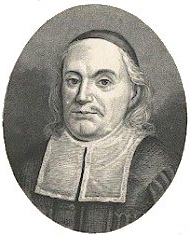Hinweise zum Datenschutz in Bezug auf eingebettete youtube-Videos
1) O Lord, how shall I meet You,
how welcome You aright?
Your people long to greet You,
my Hope, my heart’s Delight!
O, kindle, Lord most holy,
Your lamp within my breast
to do in spirit lowly
all that may please You best.
2) Love caused Your incarnation;
love brought You down to me.
Your thirst for my salvation
procured my liberty.
O, love beyond all telling,
that led You to embrace
in love, all love excelling,
our lost and fallen race.
3) Rejoice, then, you sad-hearted,
who sit in deepest gloom,
who mourn your joys departed
and tremble at your doom.
Despair not; He is near you,
there, standing at the door,
who best can help and cheer you
and bids you weep no more.
4) Sin’s debt, that fearful burden,
let not your soul distress;
your guilt the Lord will pardon
and cover by His grace.
He comes, former procuring
the peace of sin forgiv’n,
for all God’s ons securing
their heritage in heav’n.
5) He comes to judge the nations,
a terror to His foes,
a light of consolations
and blessed hope to those
who love the Lord’s appearing.
O glorious Sun, now come,
send forth Your beams most cheering
and guide us safely home.
Liedtext: Paul Gerhardt (1607-1676)
Übersetzung ins Englische: Catherine Winkworth (1827-1878)
Fassung im Choralbuch für England von 1863:
1) Ah! Lord, how shall I meet Thee,
How welcome Thee aright?
All nations long to greet Thee,
My hope, my sole delight!
Brighten the lamp that burneth
But dimly in my breast,
And teach my soul, that yearneth
To honour such high guest.
2) Thy Zion strews before Thee
Her fairest buds and palms,
And I too will adore Thee
With sweetest songs and psalms;
My soul breaks forth in flowers
Rejoicing in Thy fame,
And summons all her powers
To honour Jesus‘ name.
3) Nought, nought, dear Lord, could move Thee
To leave Thy rightful place
Save love, for which I love Thee;
A love that could embrace
A world where sorrow dwelleth,
Which sin and suffering fill,
More than the tongue e’er telleth;–
Yet Thou couldst love it still!
4) O ye sad hearts that sicken
With hope deferred, and see
The gloom around you thicken,
The joys ye hoped for flee,–
Despair not, He is near you,
Yea, at the very door,
Who best can help and cheer you,
He will not linger more.
5) Nor sin shall make you fearful,
Ashamed to see His face,
The contrite heart and tearful
He covers with His grace;
He comes to heal the spirit
That mourneth sin-oppressed,
And raise us to inherit
With Him our proper rest.
6) He comes to judge the nations,
A terror to His foes,
A light of consolations
And blessed hope to those
Who love the Lord’s appearing:
O glorious Sun, now come,
Send forth Thy beams of cheering
And guide us safely home!
Quelle: The Chorale Book for England. Catherine Winkworth (editor). Grand Rapids, MI; Christian Classics Ethereal Library, 1863 [Digitalisat bei Hymnary.org]
Denomination: Anglican
Melodie: 1613 (1614), Melchior Teschner (1584-1635) „Valet will ich dir geben„;
1653, Johann Crüger, Praxis Pietatis Melica, Editio V.
Links und Verweise:
Liedeintrag bei Wikipedia (EN)
Notensatz, 4stimmig, mit englischem Text (Winkworth/Crüger, als pdf, externer Link zu Hymnary.org)
Audiofiles der Melodie (Crüger, midi / mp3, externer Link zu Hymnary.org)
Notensatz, 4stimmig, mit deutschem Text, Lied Nr. 50 aus „Jugendharfe„ (Melchior Teschner, als Bildfile, externer Link zu Hymnary.org)
Crüger, Johann: Praxis Pietatis Melica. Das ist: Übung der Gottseligkeit in Christlichen und trostreichen Gesängen. Editio V. Runge, Berlin 1653, pp. 779ff. (Digitalisat der Bayerischen Staatsbibliothek).

